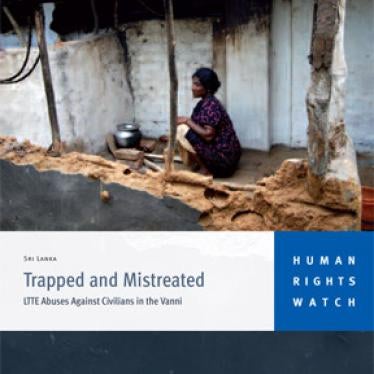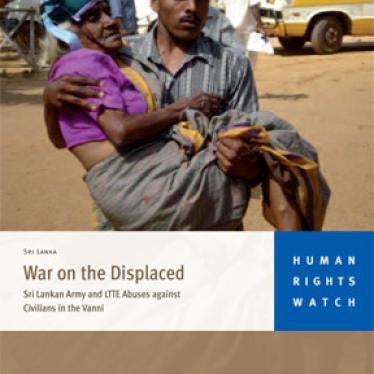International Monetary Fund
700 19th Street NW
Washington, DC 20431
Re: Sri Lankan Request for IMF Loan
Dear Executive Directors:
I wrote to you in March regarding Sri Lanka's request to the International Monetary Fund for a US$1.9 billion emergency support loan. I expressed Human Rights Watch's grave concerns regarding the humanitarian crisis in northern Sri Lanka that has resulted from intense fighting between government forces and the Liberation Tigers of Tamil Eelam (LTTE), and the urgent need for the Sri Lankan government to comply with international humanitarian and human rights law so that the emergency support loan achieves its intended objectives.
I am writing to urge you to delay the emergency support loan until the Sri Lankan government adopts certain measures, set out below, to address the worsening humanitarian crisis.
Since my March letter, the situation in northern Sri Lanka has deteriorated dramatically. According to the United Nations, as of late April more than 6,500 civilians have been killed and more than 13,000 wounded in the conflict area since January 2009. Given the intense fighting in the past two weeks, those numbers have increased significantly.
Both parties to the conflict have continued to repeatedly violate international humanitarian and human rights law. The LTTE has violated the laws of war by using civilians as "human shields" and preventing them, including through violence, from fleeing the combat zone. Human Rights Watch has been a strong critic of the LTTE for many years. Its recent behavior has been inhumane in the extreme.
Yet this provides no excuse for government abuses. The Sri Lankan government has indiscriminately used heavy artillery and aerial bombardment in the government-declared "no-fire zones," where more than 50,000 civilians currently remain trapped. The government has repeatedly denied that it has used heavy artillery in the densely populated no-fire zone. However, photographs, satellite images, and witness accounts from refugees who have fled the zone indicate that the Sri Lankan army has repeatedly shelled the area, which has now shrunk to 2.5 square kilometers. On the night of May 9 alone, 378 people were reportedly killed and 1,222 injured from a massive artillery attack, according to a government physician working in the war zone.
Sri Lankan forces have also repeatedly struck hospitals in the northern Vanni area in indiscriminate artillery and aerial attacks. Patients, medical staff, aid workers, and other witnesses have provided Human Rights Watch with information regarding at least 30 such attacks on permanent and makeshift hospitals in the combat area since December 2008. One of the deadliest took place on May 2, when artillery shells struck Mullaivaikal hospital in the no-fire zone, killing 68 persons and wounding 87.
The vulnerability of civilians trapped in the combat area is compounded by acute shortages of food, water, and medical supplies. The government has refused to allow adequate humanitarian personnel and delivery of essential relief supplies, denying civilians critical assistance. Refugees rescued off the coast of India on April 29 after fleeing the combat zone reported that food aid provided by the government was only a fraction of what was needed, and that anesthesia and critical medicines were not available. Many internally displaced persons who managed to flee the fighting had not eaten for days.
A statement issued by four senior UN human rights officials (see attached) on May 8 called the situation "catastrophic" and stated that for civilians who manage to escape death or injury from the fighting, the lack of essential services amount to "an effective death sentence." In early May John Holmes, the head of the UN's humanitarian coordinator, warned of a "bloodbath;" yesterday the UN's spokesperson in Colombo said that the bloodbath had materialized.
To hide what is happening the government has effectively banned impartial outside observers, including journalists functioning independently and human rights monitors, from the combat area. Journalists from major international media have been denied entry into Sri Lanka, while others have been deported for reporting information critical of the government. The resulting blackout on independent sources of information has, according to the UN human rights officials, created a "dramatic lack of transparency and accountability." They state that without outside observers, "it is impossible to verify any of the government's claims as to the number of casualties to date or as to the steps it is taking in order to minimize the further killing of innocent civilians and ensure delivery of humanitarian assistance."
The situation is also dire for the roughly 200,000 civilians who have fled the fighting and reached government-controlled areas. They continue to face shortages of food, water, shelter, and sanitation while awaiting government screening and registration before being transferred to closed government detention camps, which the government calls "welfare centers." The government continues to deny civilians in the camps freedom of movement outside the camps, even though many have family members in the area who could provide assistance and shelter. The government's failure to release people from the camps has resulted in severe overcrowding, accompanied by lack of adequate food, water, and medical services.
The Sri Lankan government has said that the aim of the IMF loan is to "continue with the resettlement, rehabilitation and reconstruction work in the Northern Province, and with the continued rapid development of the Eastern Province," which it considers essential "not only to uplift the living standards of the people in the areas affected by the decades long conflict, but also to successfully implement the government's efforts to bring a sustainable solution to the conflict." However, its actions are contrary to those objectives and cast doubt on the government's ability and willingness to effectively use the IMF's funds for their stated purpose.
The government's actions seriously undermine the possibility of successful post-conflict reconciliation and reconstruction in Sri Lanka. It continues to put tens of thousands of civilian lives at risk and denies the rights of persons displaced by the conflict. Both parties to the conflict have repeatedly ignored appeals by the United Nations and other members of the international community to minimize harm to civilians in the conflict area. Some IMF members have rightly raised concerns regarding the appropriateness of approving the requested loan without immediate changes in the government's conduct.
We understand that the financial situation of the government is dire, but so are the circumstances of some 200,000 civilians. We urge you and other IMF members to delay approval of the standby arrangement until the government of Sri Lanka takes the following steps to ease the humanitarian crisis:
- Establish immediate safe humanitarian corridors to enable civilians to flee the fighting and to access assistance provided by humanitarian agencies;
- Allow humanitarian relief agencies, journalists and human rights monitors access to the conflict area;
- Allow international monitoring throughout the screening and registration process for internally displaced persons;
- Ensure that camps for displaced persons are placed under civilian control, with full humanitarian access, that residents enjoy their right to freedom of movement, and that residents are released and reunited with separated family members at the earliest possible opportunity.
IMF members should communicate to the Sri Lankan government both privately and publicly that these actions are necessary to establish confidence that an IMF loan will not be associated with grave violations of the international humanitarian law and human rights law.
Thank you for your consideration.
Sincerely,
Brad Adams
Executive Director
Asia Division








